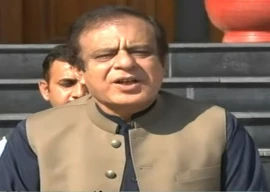
KARACHI: For all its directionless meanderings over the 1980s and 1990s, Lollywood is not entirely dead and has a bright future. This was the general opinion expressed by film critics, directors, producers, writers, and just plain old enthusiasts of the big screen at a session held under the banner of the Karachi Literature Festival organised by the Oxford University Press and the British Council.
Everyone was eager to show that there was still life in Lollywood that would take on Bollywood at its own game. But sadly, what came across the most, was that Lollywood had a great past and was still just hoping for a great future.
Javed Jabbar simplified it for everyone. If something done fifty years ago was still being talked about, then it was good cinema that deserved to be classified as literature. Take films made in the 1960s and 1970s that people still talk about: Badnaam, based on a story by Manto, Saiqa, based on a novel by Razia Butt, Aik Gunah aur Sahi, again Manto, Heer Ranjha by Waris Shah and Umrao Jaan Ada among others.
The ever-prepared Jabbar almost hogged the limelight, which wasn't a bad thing since he had a lot to say, and didn't pull any punches. Muniba Ahmed moderated and Rachel Dwyer and Asif Noorani were pannelists. Their discussion proved to be an ambitious attempt at saying that cinema was also a part of literature and as such, it needed to be revived.
Having said that, Jabbar made it clear that film and print were independent mediums and it was unfair to expect adapted screenplays to stay true to the actual storyline. It would be hard to persuade people that cinema was true literature, because literature is usually the work of a single mind and collaborative art is not generally accepted as literature. As such, cinema, where 50, 100 or even more people are involved in the making of a film, is almost the anti-thesis of creativity.
Dwyer pointed out another change in trends - readers and viewers no longer seem to feel that literature had to be sad or weepy to be considered good. "The youth, it seems, feel that literature can be good and still make us happy," she remarked.
Jabbar praised progressive Indian attitudes towards film-making where the trend is towards presenting dissenting points of view. "The break-up of Pakistan in 1971 has sadly not been the subject of a single film to date," he said, giving an example.
The decision to ban Pakistani films after the 1965 war was the worst decision that could have been made. Jabbar gave examples of films that had actually done good business in India until this.
Dwyer was overshadowed by Jabbar for the better part of the discussion but she did say that cinema was an integral medium now since it was overwhelming other cultures.
And if Pakistan hopes to beat India at its game, there can be a stronger medium than cinema.
Published in The Express Tribune, February 7th, 2011.





































1713509570-0/Taylor-Swift-Album-Release-(1)1713509570-0-270x192.webp)















COMMENTS (6)
Comments are moderated and generally will be posted if they are on-topic and not abusive.
For more information, please see our Comments FAQ